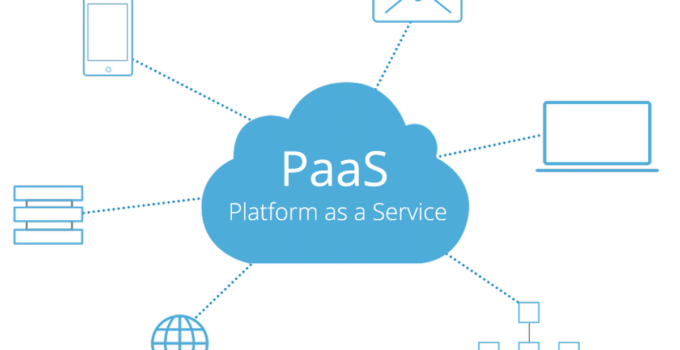In business, people are always looking for ways to streamline processes. With the rate of which things in business change, it is important for processes to be as efficient as possible, so that businesses can adapt to changes more effectively. We spoke to a company about this recently. TechQuarters, who are in the IT sector, cited cloud computing as a prime example of how businesses have been able to streamline and enhance processes to make them orders of magnitude more efficient and productive than they used to be. A great example is with Platform as a Service, and how it revolutionised the way businesses developed custom apps.
What is PaaS

Source: mc.today
The term Platform as a Service, which is commonly referred to as ‘PaaS’ describes a set of services that are hosted and deployed via the cloud, which enable organisations build, deploy, manage, and protect custom applications much more quickly compared to on-premise development solutions.
PaaS is usually offered via a Public Cloud Provider. These are companies who have built, and maintain, their own (very large) cloud that has the resources necessary to support thousands of organisations simultaneously – some examples of Public Cloud Providers include Salesforce, Microsoft, IBM Cloud, and many more.
It is the Cloud Providers who manages all of the hardware and software necessary to run a Platform as a Service so that, on the end-user’s side, they simply need to pay for access to the service, and do not need to worry about any of the platform maintenance. A good PaaS solution will have many positive characteristics, such as:
- Managed Cloud Infrastructure – one of the key characteristics of PaaS is that they are managed by a provider, but they may not offer a fully managed infrastructure. The benefit of a fully managed cloud infrastructure is that the security and governance of the platform will be of a much higher standard (due to the greater investment).
- Drag-and-Drop Development – Platform as a Service is meant to make app development accessible for any organisation, which means the best services aren’t just geared towards those with development backgrounds. Elements like drag-and-drop layouts and pre-coded app components mean that even people who aren’t familiar with traditional development can quickly learn to build apps in a PaaS environment.
- Multi-Language Development – in this context, language means program languages. The benefit of multi-language support means that developers will have access to whichever programming languages they are familiar with. At the same time, they have access to other languages, so that they can build on their knowledge.
- Mobile SDK – software development kits (SDK) make it easier to develop applications for a specific hardware platform and/or operating system. Mobile applications are becoming more widely used all the time, and more businesses are looking to leverage the platform, which is why a good PaaS solution in 2024 should include an SDK for building mobile apps.
Why Are Businesses Adopting PaaS?

Source: businessnewsdaily.com
The short answer is because, thanks to Platform as a Service, app development has never been easier. Before cloud computing became accessible, organisations needed to build their entire DevOps infrastructure themselves – this means investing money in servers and software stacks, and configuring everything themselves; and because development tools become outdated rapidly, even after they had the infrastructure to start developing apps, they needed to be mindful of when it would need updating.
Platform as a Service is the culmination of the collective search for solutions to make development quicker, cheaper, and easier. When cloud computing began maturing, it became clear that it was the ideal solution. Virtualising servers, development tools, programming environments, and more, and making them accessible via any endpoint meant that businesses were suddenly able to develop apps in a fraction of the time.
Advantages of PaaS

Source: nttdata-solutions.com
Platform as a Service enables a business to consolidate all of the resources required to develop their own custom application.
- Speed – When an organisation’s IT department and DevOps team do not have to worry about managing the development platform themselves, it makes app development a lot quicker. This applies to both the initial start-up of your DevOps (PaaS is immediately usable upon signup), and also ongoing app lifecycles, because Platforms as a Service offer a wealth of tools and templates, code libraries and build packs which make the development process more streamlined.
- Cost – The lack of hardware and software investment also represents significant cost efficiency compared with traditional app development. What is more, using PaaS allows you to reuse components and resources you used for previous development cycles – this means you don’t have to start from scratch each time, thus saving time and, by extension, money.
- Scaling – One of the key qualities of public cloud services is the capacity to scale up resources in response to a hike in demand. This can be seen across all kinds of cloud services – such as with Desktop as a Service, and the ability to configure and deploy OS licenses quickly in response to workforce growth. When if the usage of your app increases beyond expectations, PaaS will make it easy to accommodate the demand.
- Integration – If you have legacy systems in operation – which most organisations will have – platform as a service makes it easy to integrate the data from those systems into your cloud-based applications.
- Easy Maintenance – Platform as a service is a public cloud service, meaning that the public cloud provider (such as Microsoft) manage all the hardware and software maintenance that goes into running a cloud-based application development platform. An organisation using PaaS need only concern themselves with managing the apps they have developed.
- User-Derived Insight – Large scale Platforms as a Service will be used by many thousands of organisations. The inflow of data that PaaS providers get from their customers enables them to draw insights into common issues and quickly develop solutions for them.
- Productivity – As has been outlined a number of times in this article, Platform as a Service enables organisations to consolidate and streamline their workloads with relation to DevOps, and also money that would have been dedicated to hardware and software investments. Organisations can re-allocate that spare budget wherever they like, as well as the extra time and resources they get back from using PaaS.




